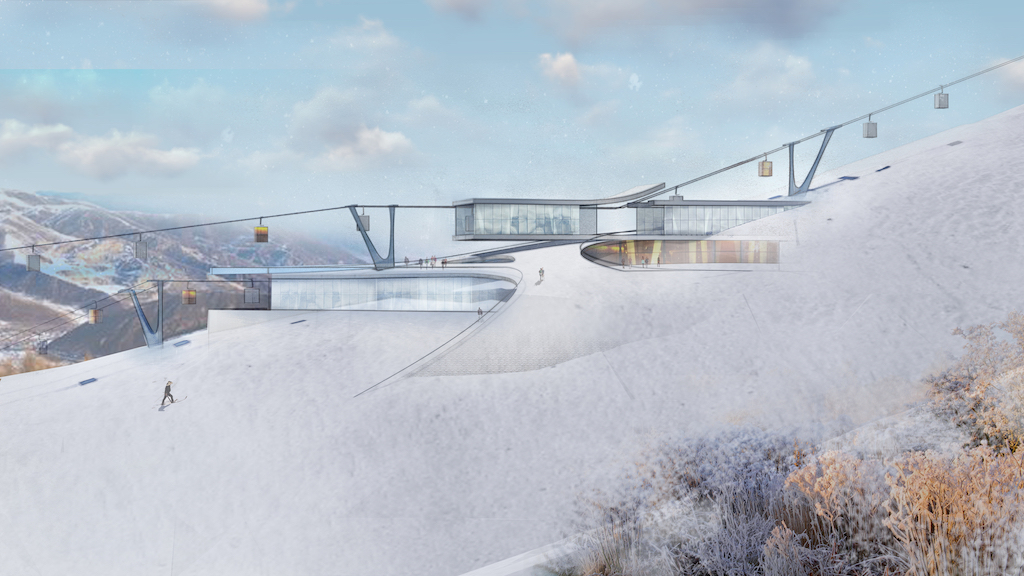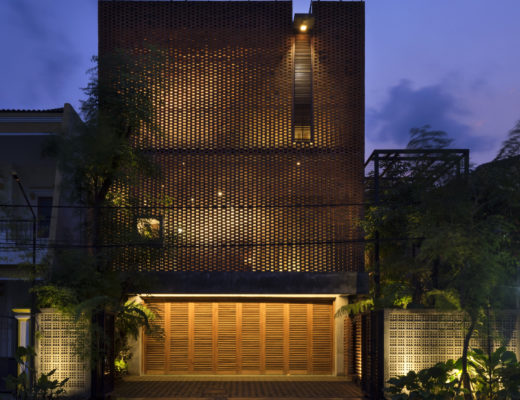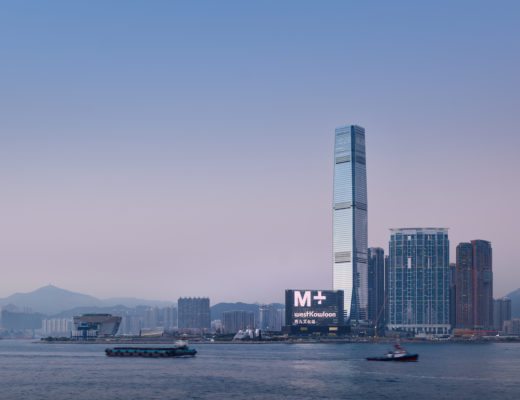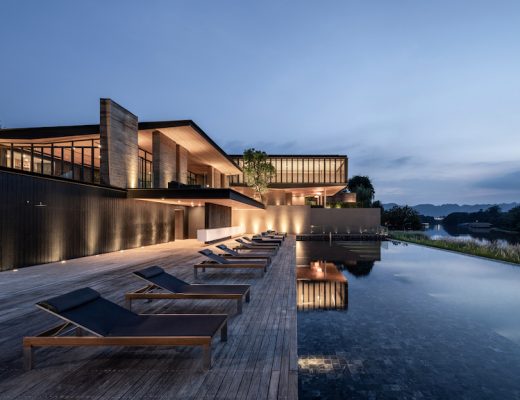Beijing-based practice maison h has unveiled its design for the world’s first Winter Olympics Museum for the Beijing 2022 Winter Olympics. The project aims to preserve the legacy of the 2008 Beijing Olympics and leverage it to drive sustainable social and economic development.
According to IOC president Thomas Bach, Beijing 2022 is to “set a new benchmark for a sustainable Olympic Games, on the one hand benefiting from the legacy of the Beijing 2008 Games and on the other hand developing a new winter sports destination in a sustainable way”.
Beijing will be the first city in the world to host both the Summer and Winter Olympics, a strategic move that will see the country reuse and rejuvenate its urban venues and extend development advantages to the surrounding rural areas for infrastructure development.
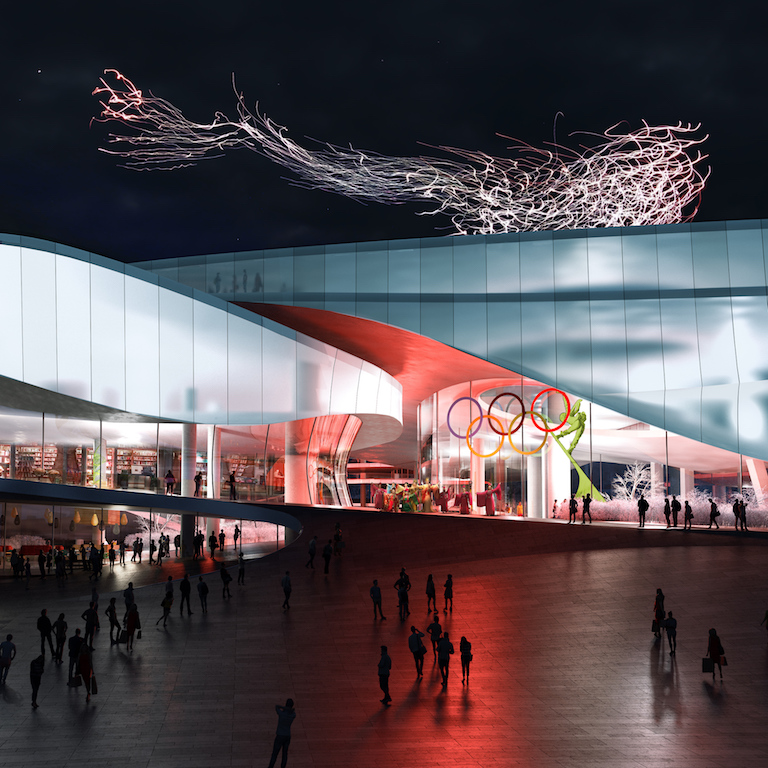
In addition to using the venues built for the Beijing 2008 Olympics, as well as Shougang – the spectacular former steel plant, Beijing’s urban area will host all the ice events (curling, ice hockey and skating), four snow events (snowboard big air and freestyle skiing big air, men’s and women’s) and the new Big Air Snowboarding event. Two key regional centers: Yanqing, home to the Great Wall, and Chongli, an existing skiing destination are to host the alpine skiing, sliding, and all other snow events respectively. A new highway and high-speed train will connect the Chongli region to Beijing in 46 minutes.
For Chongli, this is a great opportunity to derive advantage from being one of the pivotal locations due to its mountainous terrain. To optimise this opoortunity, Chongli local government launched a plan to revitalise the town centre with the addition of the world’s first Winter Sports Museum and Academy to best convey the Olympic Spirit to future generations. Following an open public bidding process, maison h was selected for a competition with two other teams for both the building design and town center redevelopment.
The aim of the Winter Olympic Museum is much more than museum. In addition to exhibition venues, maison h conceived a specific programme that also includes a dedicated Olympic Academy with libraries and research facilities focused on the Winter Olympics, Youth Olympic Training Centre, VR Experience Centre, Mountain Sports Centre, Cable car station and related commercial as well as conference facilities; an integral plan to lift the region’s economy in a sustainable way.
In the design for the masterplan, maison h looked beyond the site limits and aimed to integrate the wider 2022 Winter Olympic venues, the surrounding mountains, Chongli’s various existing ski resorts, and new developments in a linked plan that includes 180,000m2 of mixed-typology residential areas and related public facilities.
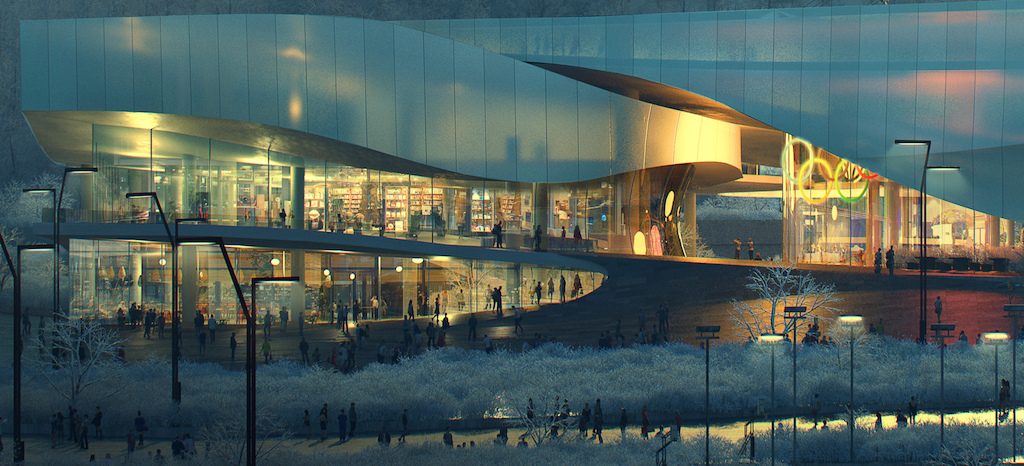
Taking into account the site’s urban and regional context, and the building as a symbol of the Olympic Legacy, the design aims to anchor the urban space while integrating the topography of the natural surroundings into the buildings’ architecture. Starting from the town center side that forms the formal front of the project, the existing sloping terrain is gently sculpted into a public route that provides direct access to every floor in the building.
From the mountains behind, a new ski-slope will pass under the existing highway ending in the heart of the new building. Visitors can reach the top of the ski slope and an adjacent Hall of Fame by a direct cable car connection from the building’s central valley. The proposed cable station further links to planned ski resorts and slopes.
To uphold the symbolic significance of Olympics as a global sports event that unifies, maison h proposed a welcoming and fluid space for the building design that is open, inclusive and without dividing walls. The landscape is seamlessly interwoven to become an indoor exhibition areas, a climbing wall or conference seating. The building mass is lifted off the ground with a minimum footprint thus respecting the natural environment while improving quality and connectivity of the public space in Chongli to the comprehensive regional development plan.
The building has been conceived as a state-of-the-art sustainable building, optimised for the harsh local climate, with self-shading facade overhangs, minimal window openings on the South and West sides, and a zero-energy power concept with PV panels on the roof.
maison h team comprising architects Martijn de Geus, Han Zhang, Oxana Sosnitskaya, Victor Tee, Thomas Mellegaerd and Elena Gamez Miguelez received the second prize in this public tender.

